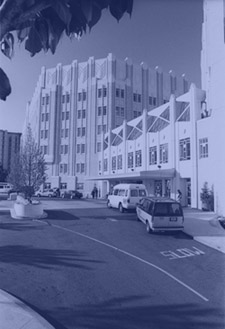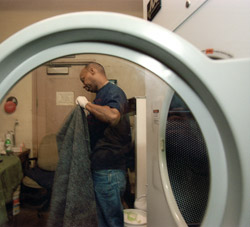|
|
|
Nowhere Else to Turn: Harborview Services Extend Care for the Neediest into the Community
|
|
|
 |
|
|
Harborview Medical Center
|
|
|
|
|
|
|
|
A small support group of middle-aged men has gathered after work. Some were first hospitalized with mental illness as teenagers; others spent years in institutions or on the streets. Each projects a gentle vulnerability. One sums up his bitter past as “being treated like a child, or like a vegetable, or like a dog.” Then he tells of his pride in his current independence, working at a downtown Seattle department store. With help from Harborview Mental Health Services, all these men hold regular jobs in the community.
The mission statement of Harborview Medical Center, managed by the University of Washington for King County, commits the hospital to providing care for the neediest and those who have nowhere else to turn. Among others explicitly mentioned are the mentally ill, the indigent and homeless, substance abusers, and victims of sexual assault.
For these people, health services reach beyond the hospital. Harborview’s care is extended through a variety of community services offered at no or low cost to people in need. These programs include:
- Employment Services at Harborview Mental Health Services
Supported employment out in the community for the mentally ill.
People with illnesses such as schizophrenia and manic-depression are assisted in preparing for employment and in finding a job. After hire, Harborview managers provide both employee and employer with ongoing support. Employment in the community establishes a routine that helps clients manage their lives and cope with social interaction. Businesses ranging from Safeway and Bon Marche to the UW Recycle Center have successfully participated.
- The Respite Program
Shelter and support services for acutely injured or ill homeless people following hospitalization.
Twenty-four hour shelter, daily nursing care, food, and laundry services are provided to homeless people released from the hospital. Funded by Public Health - Seattle & King County and managed out of Harborview’s Pioneer Square Clinic, the program reserves 17 beds at the Salvation Army’s William Booth Center for men and six beds at the YWCA for women. Counselors provide mental health screening, treatment referrals, benefits assistance, and housing referrals and try to get patients established with primary care prior to discharge.
- Harborview Tower
Emergency accommodations for families of out-of-town patients in the intensive care unit (ICU).
As the only Level 1 trauma center serving Alaska, Idaho, Montana, and Washington, Harborview gets regular airlifts of severely injured or ill people. Family members often end up sleeping in the ICU waiting room. Harborview reserves six apartments in a privately owned building near the hospital. Each has one bedroom, a kitchen, and a living room with a sofa bed. Priority is given to the families of pediatric patients and those with the least resources.
- Admiral House and Plymouth House
Residential accommodation for the mentally ill.
Admiral House is home to 15 people with chronic mental illness. Managed by the Seattle Housing Authority, it is a cheerful apartment building in West Seattle, close to local stores and bus lines. Plymouth House is a temporary home where mentally ill, homeless people can recover following hospitalization. The renovated eight-bedroom house on Beacon Hill is owned and operated by Plymouth Congregational Church. The house accommodates four clients and four church-appointed companions. At both houses, Harborview case managers assist with medications and counseling.
- The Therapy Network for Sexual Abuse Survivors
Private therapy for adults sexually assaulted as children.
Adult survivors of sexual abuse typically require long-term therapy. Yet they may not be able to receive counseling services, which tend to give priority to recently assaulted victims. Low-income clients are referred to a volunteer network of state-licensed therapists—social workers, psychologists, and counselors—who provide therapy for a nominal fee. The network is managed in collaboration with Harborview Center for Sexual Assault and Traumatic Stress. All the therapists have experience and training in sexual abuse treatment.
|
|
 |
|
|
Harborview community service programs help people regain their self-worth.
|
|
|
|
|
|
|
Two Lives that Were Changed
A middle-aged Seattle man with a history of serious mental illness struggled for more than a decade with homelessness and substance abuse. Six years ago, he found his first job through Harborview’s Employment Services program. He recalls an epiphany: if he did well, he could hope for a better job.
“I’d never thought that before,” he said, “I’d never worked.” For the past two and a half years, he has worked full time as a janitor. His illness controlled by medication, he is off Social Security and lives independently. In 2002, he began taking community college classes.
A patient was admitted to Harborview Medical Center last winter with pneumonia and with infected abscesses from shooting heroin. An addict and street person all of his adult life, the man was in poor physical condition on discharge and entered the Respite program at the William Booth Center. That proved a turning point. During the month he spent in care, he determined to clean himself up.
“These people helped me get back on my feet,” said the man. “They saved my life.” He is clean and sober, living at a church-run shelter, and working a 40-hour-a-week job.
Harborview Medical Center is proud of its personnel and their focus on the needs of the community, especially in helping persons in difficult circumstances. In addition to caring for the needy through their daily work, Harborview faculty and staff pledge hundreds of thousands of dollars to Harborview’s community services during the annual staff campaign. Their gifts support the Burn Center Fund, the Child Care Assistance Fund, the Spiritual Care Program Fund, and many other humanitarian efforts.
|













